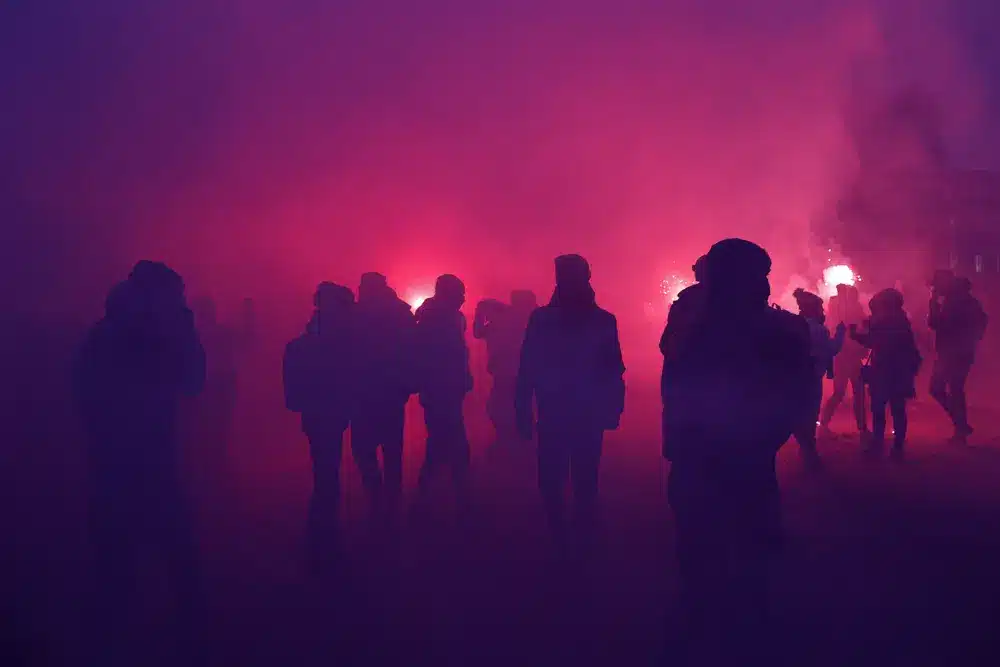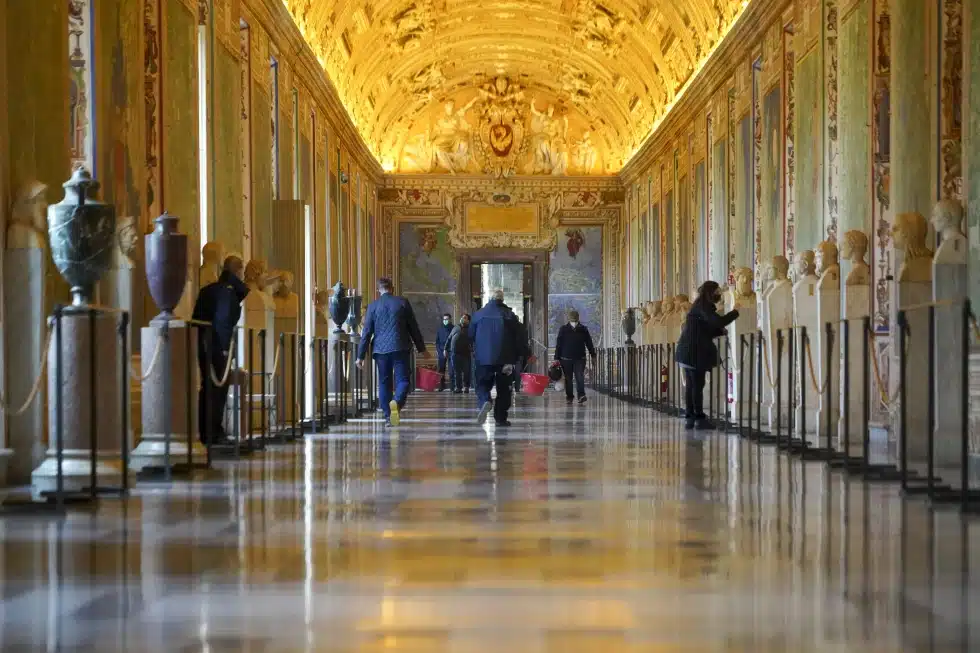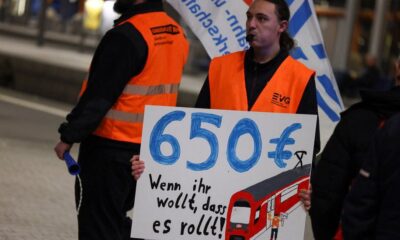U.K News
FRENCH: Unions Buoyant As 1.27 Million French Protest Pension Reform

PARIS, France — According to the Interior Ministry, an estimated 1.27 million people took to the streets of French cities, towns, and villages on Tuesday in massive protests against President Emmanuel Macron’s plans to raise the retirement age by two years.
In a big win for labor unions, more people showed up than at the last round of strikes and protests against the proposed pension system changes. Prime Minister Elisabeth Borne had to say that her government “hears” the “questions and doubts” raised by reforms that would raise the retirement age from 62 to 64.
The eight unions that organized the protests announced new demonstrations for February 7 and 11.
“In the face of widespread opposition, the government must pull back on its reform,” said Patricia Drevon of the Workers’ Force union, who stood with other union members in a rare public show of unity.
According to the powerful CGT union, 2.8 million protesters marched in french on Tuesday.
The Franch Love To Strike
National strikes and protests were a litmus test for Macron and his opponents. The government has said that it is determined to keep Macron’s promise to change French pension system, which he made during the election. But a lot of people will be against the bill, which will help labor unions and left-leaning lawmakers stop it.
Later Tuesday, Prime Minister Borne extended a tentative olive branch to protesters and unions, tweeting: “The retirement reform raises questions and doubts. We can hear them.”
This means that changes are possible, but not necessarily a full withdrawal, which is what protesters have been calling for. According to her tweet, the upcoming debate in parliament “will allow us… to enrich our project with a goal” of ensuring the future of France’s pension system. “We bear responsibility.”
Borne recently stated that raising the retirement age to 64 is “no longer negotiable.” On Monday, Macron defended the reform as “vital.”
According to police, 87,000 people took to the streets in the capital, up from 80,000 in the first major pension protest on Jan. 19, when authorities claimed 1 million people demonstrated nationwide. Estimates from the union had more than doubled that figure.
Radicals And Riot Police Clash
The otherwise peaceful Paris march was marred by sporadic clashes between a small group of black-clad radicals and riot police, who fired tear gas near Les Invalides, the site of Napoleon’s tomb, where the march ended. There were 30 arrests there and along the route, according to police.
11,000 police officers were on duty for an estimated 250 protests across the country.
“The government is currently backed into a corner. “It only needs to withdraw its reform,” Erik Meyer of the Sud Rail union, one of eight unions that organized the march, told BFM TV.
Veteran left-wing leader Jean-Luc Mélenchon praised the protests as “historic” and predicted Macron’s defeat.
“We don’t see such a mass mobilization very often,” he said in the southern city of Marseille. “It’s a type of citizen insurgency.”
The demonstrations were not limited to France’s major cities. On Ouessant, a tiny western isle of about 800 people off the coast of Brittany, about 100 protesters gathered outside Mayor Denis Palluel’s office and marched, he said.
Retiring At A Reasonable Age Is Important To The French People
The prospect of having to work longer hours alarmed mariners on the island with difficult ocean-going jobs, according to Palluel.
“It’s important to retire at a reasonable age because life expectancy isn’t very long,” he says.
Protests by people of all ages were loud and colorful, with sirens, bullhorns, and smoke bombs, continuing a long tradition of taking democracy to the streets in France.
Strikes disrupted services across France on Tuesday, in addition to the protests.
According to SNCF, most train services in Paris, other regions, and France’s flagship high-speed network connecting cities and major towns have been disrupted. Station closures and cancellations also impacted the Paris Metro.
Power workers in key positions, who are not allowed to go on strike, showed their support for protesters by temporarily cutting electricity supplies without causing blackouts, according to the company that makes the electricity, EDF.
Local Striking Impacted Schools
Civil servant Jamila Sariac, 60, believes the pension system should be left alone.
“Social protection is a milestone of our society, a milestone that the government wishes to break,” she said, adding that strikes would put more pressure on the government than protests. “We owe it to our forefathers who contributed to France’s wealth.”
Said Belaiba, who works in construction, was one of the people whose train from Paris to Lyon in the morning was canceled, so he had to wait. Nonetheless, the 62-year-old said he was opposed to the proposed reform.
“My job is physically demanding,” he admitted. “You can’t keep going past 64.”
Strikes also impacted schools, with the Education Ministry reporting that roughly one-quarter of teachers remained absent from work — fewer than in the previous round of protests.
Walkouts in oil refineries were also reported in French media. Because of the strike, radio station France Inter played music instead of its usual morning talk shows and apologized to its listeners.
SOURCE – (AP)
World
Vatican Museums Staff Challenge The Pope With A Legal Bid For Better Terms And Treatment

ROME — In an uncommon public challenge to Pope Francis’ leadership, 49 Vatican Museums employees have launched a class-action complaint with the Vatican administration, asking for higher seniority, leave, and overtime benefits.
The complaint, dated April 23 and published this weekend in Italian newspapers, also claimed that staff faced health and security hazards as a result of cost-cutting and apparent profit-generating activities at the museum, such as congestion and fewer security guards to keep tourists at bay.

pixabay – VOR News Image
Vatican Museums Staff Challenge The Pope With A Legal Bid For Better Terms And Treatment
An email seeking comment received no response from the Vatican spokesman or Cardinal Fernando Vérgez Alzaga, chief of the City State administration that oversees the museums.
The complaint is the latest judicial challenge highlighting how the Vatican’s laws, regulations, and procedures frequently conflict with Italian and European principles. Recently, civil and criminal cases have revealed how employees, particularly lay Italian nationals, have little or no legal recourse outside the city state’s unique court system, an absolute monarchy in which Francis wields supreme executive, legislative, and judicial power.
Museum employees cited the Catholic Church’s social teaching and Francis’ appeals to employers to respect workers’ dignity when requesting better treatment in the class-action complaint that senior Vatican attorney Laura Sgro filed and signed on behalf of the 49 employees.

Pixabay – VOR news Image
Vatican Museums Staff Challenge The Pope With A Legal Bid For Better Terms And Treatment
They sought, among other things, greater transparency about how staff might develop, the reinstatement of seniority bonuses, and the Vatican’s adherence to Italian sick-day policies. According to the complaint, employees are currently required to stay at home all day, rather than just a few hours, to await a potential visit to ensure that they are not simply taking the day off.
According to Vatican labor standards, Verzaga has 30 days to react to the allegation. If no talks commence, Sgro can take the claims to the Vatican’s labor office in an attempt to reach a negotiated settlement, which might lead to a tribunal. However, the office can refuse to hear the case, and lawyers say this happens frequently, leaving the employees with no other options.
In recent instances before the Vatican tribunal, lawyers have indicated that they may seek to take employees’ grievances about the system to the European Court of Human Rights. The Holy See is neither a member of the court nor a signatory to the European Convention on Human Rights. However, some lawyers believe the Vatican committed to maintaining European human rights standards when it ratified the European Union Monetary Convention in 2009.

CNN – VOR News Image
Vatican Museums Staff Challenge The Pope With A Legal Bid For Better Terms And Treatment
The Museums are one of the principal sources of money, funding the Holy See bureaucracy, which serves as the official authority for the Catholic Church. The museums, which have experienced significant financial losses as a result of COVID-19 closures and limitations, raised the price of a full-price ticket to 20 euros ($21.50) at the beginning of the year, up from 17 euros.
SOURCE – (AP)
Entertainment
Eurovision Explained, From ABBA To Zorra, As The Israel-Hamas War Overshadows The Song Contest

Malmö, Sweden – Scores of musicians, hundreds of journalists, and thousands of music enthusiasts have converged in Malmo, Sweden, as the Eurovision Song Contest prepares for Saturday’s jubilant, glitter-drenched finale.
But even Eurovision cannot avoid the world’s divisions. Thousands of pro-Palestinian protestors are expected in the city to call for a cease-fire in the Israel-Hamas conflict and criticize Israel’s participation in the event.
Here’s an introduction to what Eurovision is, how it operates, and what to look for.
AP – VOR News Image
What is Eurovision?
The short answer is that Eurovision is a music competition in which performers from around Europe and beyond compete under their national flags for the title of continental champion. Consider these the pop music Olympics.
The longer explanation is that Eurovision is an event that combines pop, partying, and politics, resembling a music festival, an awards show, and a United Nations Security Council meeting. It’s a crazy joyful festival that celebrates music’s unifying power, but it’s also a venue for politics and regional rivalries.
AP – VOR News Image
How does it work?
This year, the tournament will be held over many days in the Swedish coastal city of Malmo, which has entries from 37 countries. The country is hosting after Swedish singer Loreen won the competition last year in Liverpool, England.
After two semifinals, the artists have been reduced to 25, and they will compete in Saturday’s final in front of thousands of fans in the Malmo Arena and a global broadcast audience estimated at 180 million.
In an unusual move, the 26th finalist, Joost Klein of the Netherlands, was removed from the competition on Saturday due to “a complaint made by a female member of the production crew” that is being probed by police, according to organizers.
Nations may enter a solo act or a band. They can perform in any genre or language, but the regulations require them to sing live and limit their songs to three minutes. Staging has become increasingly extravagant, with spectacular pyrotechnics and sophisticated dance. This year is very great for topless male dancers.
After all of the acts have been performed, the winner is determined by a notoriously complex combination of phone and online votes from all around the world and rankings by music-industry juries in each Eurovision country. As the results are announced, countries move up and down the standings, and tensions rise. Ending up with “nul points,” or zero, is considered a national shame.
Eurovision’s musical style has evolved drastically since its inception in 1956. The early years of crooners and ballads gave way to cheery pop, as exemplified by possibly the greatest Eurovision song of all time, ABBA’s “Waterloo,” which won 50 years ago.
Euro-techno and power ballads are popular nowadays, but viewers choose rock, folk rap, and odd, unclassifiable music.
According to bookies, Swiss singer Nemo is a top contender, delivering “The Code,” a beautiful, operatic ballad. Nemo would be the first nonbinary performer to win the contest with a large LGBTQ+ following. A quarter century ago, Dana International became the contest’s first transgender winner.
Another nonbinary singer gaining traction is Ireland’s Bambie Thug, whose song “Doomsday Blue” is Gothic, passionate, over-the-top, and a true crowd-pleaser. They are the only contestants to bring a “scream coach” to Malmo.
Other acts expected to perform well include operatic Slovenian singer Raiven, Ukrainian rap-pop combo Alyona Alyona and Jerry Heil, and Spain’s Nebulossa, whose song “Zorra” sparked controversy because its title can be translated as an anti-female slur.
The performer with the most traction is Croatian vocalist Baby Lasagna. His song “Rim Tim Tagi Dim” is classic Eurovision: joyful, humorous, slightly emotional, and immensely catchy. It is already a major fan favorite.
AP – VOR News Image
WHY ARE SOME PEOPLE PROTESTING?
Eurovision’s tagline is “united by music,” its organizer, the European Broadcasting Union, works to keep politics out of the competition. But it frequently intrudes.
Belarus was kicked out of Eurovision in 2021 for its government’s crackdown on opposition, while Russia was kicked out in 2022 for its full-fledged invasion of Ukraine.
This year, there have been requests for Israel’s exclusion due to its actions in the conflict against Hamas.
Israel is competing but was forced to change the title of its song, which was previously titled “October Rain,” in an apparent reference to Hamas’ October 7 cross-border raid. Eden Golan, a 20-year-old vocalist, now performs the song “Hurricane.”
Thousands of pro-Palestinian activists marched through Malmo hours before Golan performed in Thursday’s semifinal, and another is planned for Saturday. Swedish police have launched a large security operation, with officers from throughout the country joined by reinforcements from Denmark and Norway.
SOURCE – (AP)
U.K News
AstraZeneca Removes Covid-19 Vaccine from the UK Market

AstraZeneca is pulling its Covid-19 vaccine from the UK market less than four years after its debut, citing a “surplus” of vaccines targeting newer strains and declining demand.
On Wednesday, AstraZeneca stated that while it was “proud of the role Vaxzevria played in ending the global pandemic,” the company would no longer manufacture or supply the medicine due to a “surplus of available updated vaccines.”
The decision marks the end of the road for the vaccine, which was developed in partnership with experts at Oxford University within months of the pandemic’s breakout. It was authorized in the UK in late 2020, and over 3 billion doses have been distributed since its debut.
Unlike rivals Pfizer, BioNTech, and Moderna, AstraZeneca initially used a non-profit approach for its vaccine, selling it “at cost” as part of an agreement with Oxford. The medication was critical in ending the epidemic. However, its deployment was marred by rare cases of blood clotting and disagreements with the European Union over access to medicine.
“According to independent estimates, over 6.5 million lives were saved in the first year of use alone,” AstraZeneca stated, adding that additional COVID-19 vaccines have since been produced, reducing sales of its own medicine.
First Vaccine Approved in the UK
The announcement comes after the pharmaceutical company sought in March that the European Union withdraw its marketing authorization for Vaxzevria, which was granted on Tuesday.
AstraZeneca’s vaccine has been supplanted by mRNA-based vaccines produced by BioNTech/Pfizer and Moderna, which are now the most widely used worldwide.
According to the company’s full-year figures, AstraZeneca’s jab generated only $12 million in sales in 2023, compared to nearly $4 billion in 2021. In late 2021, AstraZeneca signed its first for-profit arrangements, claiming the pandemic had entered an “endemic phase.”
The vaccine was approved in the United Kingdom in December 2020 and the European Union in January 2021, but it was never approved in the United States, where authorities criticized the company’s presentation of data on vaccination efficacy.
Overall, the vaccination was safe and effective, but confidence in it dipped in 2021 following a string of rare blood-clotting occurrences, prompting European authorities to restrict its use among younger people.
Jamie Scott is suing the firm, alleging that taking the vaccine caused him to develop a major blood clot. If held accountable, the UK government’s vaccine damage payment plan would compensate for any damages. The business stated that the removal was unrelated to the uncommon blood clotting incidences.
AstraZeneca stated: “We will now work with regulators and our partners to align on a clear path forward to conclude this chapter and significant contribution to the Covid-19 pandemic.”
About AstraZeneca
AstraZeneca is a global pharmaceutical corporation based in Cambridge, England. It develops and manufactures various medications to treat various medical ailments. During the COVID-19 epidemic, the business earned headlines for its collaborative efforts to create a vaccine with Oxford University.
Vaxzevria COVID-19 vaccine was one of the first vaccines approved for emergency use worldwide. Despite initial issues with efficacy data and worries about potential adverse effects, the vaccination proved successful in preventing severe illness and death from COVID-19. It was essential in vaccination campaigns throughout Europe and the rest of the world.
Their line of pharmaceuticals extends beyond the COVID-19 vaccine to include cancer, cardiology, respiratory, and metabolic illnesses. The corporation invests substantially in R&D, hoping to bring breakthrough therapies to market. It operates in over 100 countries and employs tens of thousands worldwide.
AstraZeneca has experienced numerous controversies and legal challenges, including litigation involving drug pricing and marketing activities. However, it remains a key player in the pharmaceutical sector, strongly emphasizing scientific research and global health programs. The company’s response to the COVID-19 epidemic has strengthened its position as a major contributor to global public health efforts.
Source: The Financial Times
-

 Sports5 months ago
Sports5 months agoSaints’ Aggressive Play-Calling Ends Up Coming Back To Hurt Them In Loss To Rams
-

 Business5 months ago
Business5 months agoNike Says It Will Cut $2 Billion In Costs In A Major Warning For Consumers
-

 Business5 months ago
Business5 months agoFederal Court Revives Lawsuit Against Nirvana Over 1991 ‘Nevermind’ Naked Baby Album Cover
-

 News5 months ago
News5 months agoThe Rise of Woke Ideology in Western Culture
-

 Business5 months ago
Business5 months agoWayfair CEO: Employees Need To Work Longer Hours, After Laying Off 5% Off The Company
-

 Learning4 days ago
Learning4 days agoExploring TVA Nouvelles Quebec’s Premier News Source











































